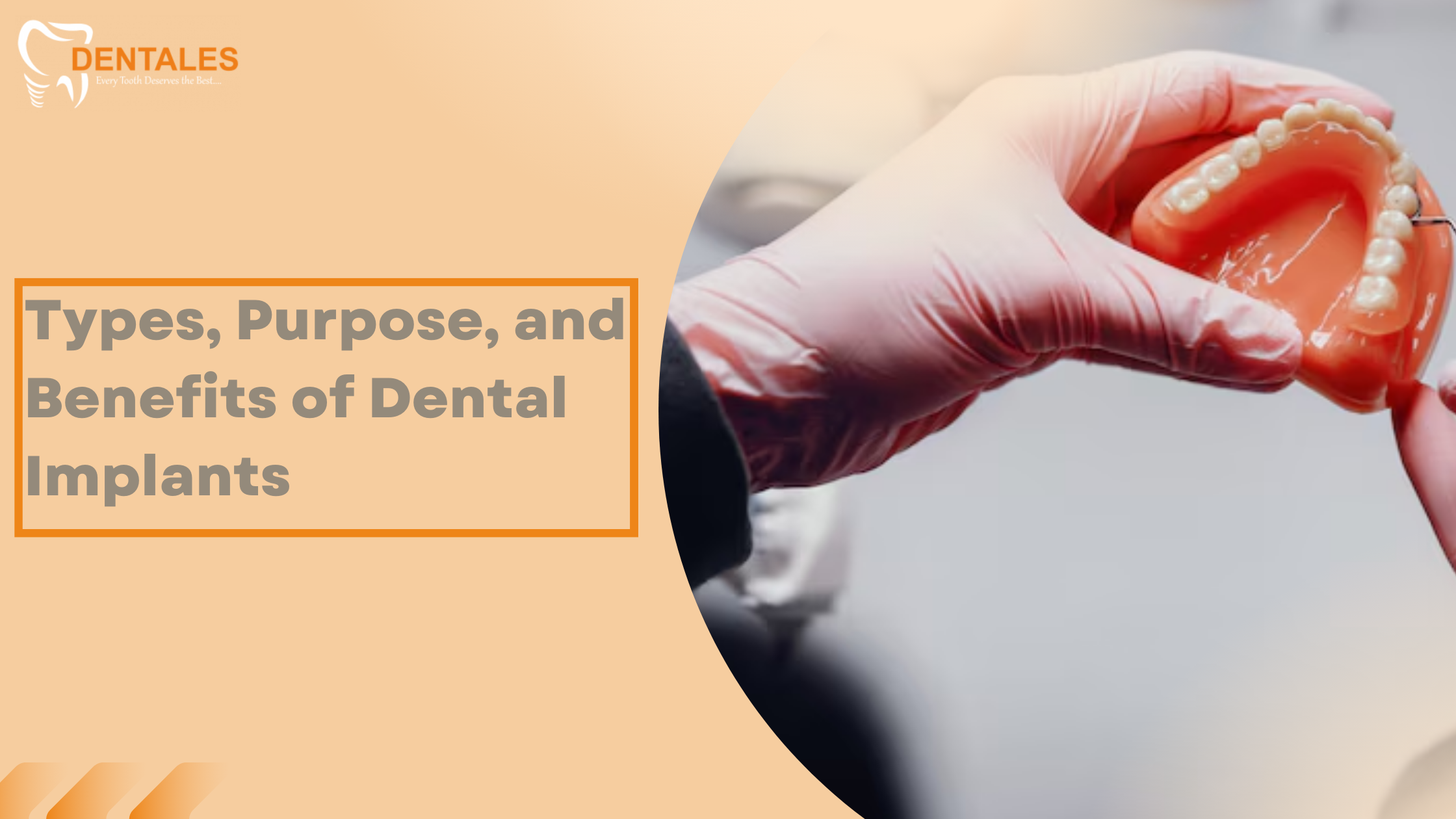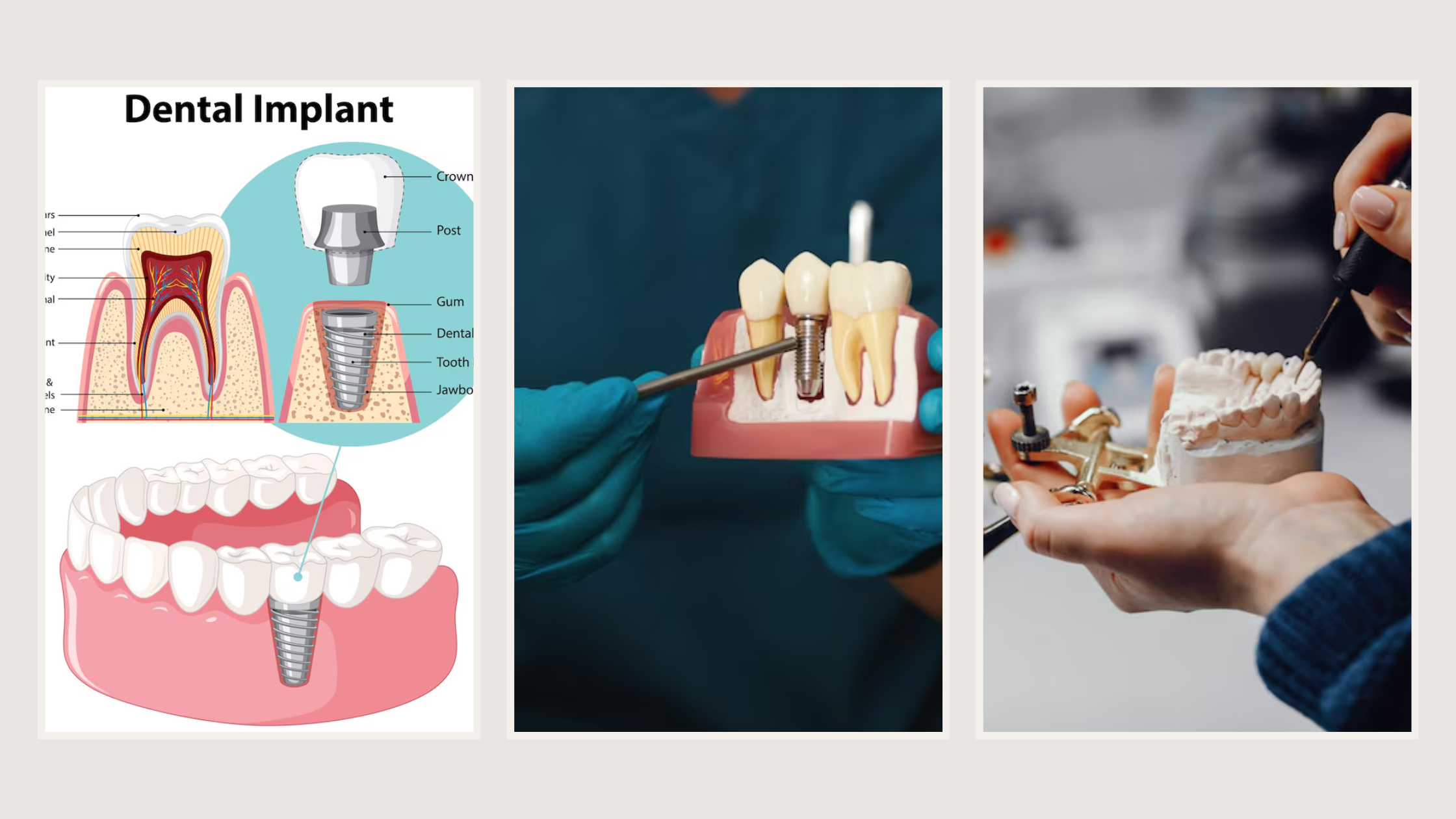
Dental Implant is a popular surgical tooth replacement alternative. They support prosthetic teeth such as crowns and dentures. Dental implant installation may involve a few processes and a few weeks of recovery. It looks exactly like a natural tooth after recovery. With careful maintenance, your implant can last for a lifetime. Modern dentistry has made tooth implants simpler and easier. It helps to bring back your dental health and a confident smile. Continue reading to learn more about dental implants.
What is a Dental Implant?
A Dental Implant is a thin and threaded post used to replace lost teeth surgically. It also improves chewing performance and oral health. The implants function similarly to natural teeth after healing. It consists of three main parts.
- Titanium post - It is surgically implanted into the jawbone and serves as a prosthetic tooth root.
- Abutment - It links the posts to the crown.
- Crown - It is a visible part that looks and functions like a natural tooth.
Types of Dental Implants
There are various types of dental implants used to replace missing teeth.
- Endosteal - It is the most popular type of dental implant. It is inserted directly into the jawbone. They are usually formed like screws and provide a solid basis for prosthetic teeth.
- Subperiosteal implants -They are placed behind the gum but above the jawbone. It is excellent for patients who lack sufficient bone height and do not require bone augmentation.
- Zygomatic Implant - It is a rare type of implant used by people. They are anchored in the cheekbone rather than the jawbone.
- Implant-Supported Bridge - An implant-supported bridge can replace many lost neighbouring teeth. A single implant holds numerous teeth together on a bridge.
Purpose of Dental Implants
- Replace lost teeth to restore functionality and appearance.
- Boost your chewing abilities and overall oral function.
- Support facial structure and avoid sagging or premature ageing.
- A natural-looking smile boosts your confidence.
- Provide a durable solution compared to dentures or bridges.
- Filling gaps helps to maintain the alignment of surrounding teeth.
- It helps you to speak clearly.
- Remove the agony and bother of removable dentures.
- Create a firm foundation for crowns and dentures.
Benefits of Dental Implants

- Dental Implants Behave as Natural Teeth: Dental implants restore full chewing ability. Most patients cannot discern the difference between their natural and artificial teeth. They can eat regularly and floss normally.
- Dental Implants Can Last For A Lifetime: Dental implants can last a lifetime. The implant is made of titanium and fits into the jawbone. The body will not reject it. Overall, it creates a strong replacement tooth.
- Dental Implants Prevent Bone Loss: The jawbone deteriorates due to a lack of stimulation with no teeth. If no implant is placed during the first year of losing a tooth, the bone area loses 25% of its volume, and the loss continues over time.
Who Needs Dental Implant Treatment
People Who Miss Teeth - Teeth transplants are frequently used to restore function and appearance in people who have lost one or more teeth due to disease or decay.
Wearers of Detachable Dentures - Implants are a viable option for denture wearers seeking a more durable and stable solution.
Patients with Failing Teeth - Implants may be necessary as a long-term substitute for people whose teeth are irreparably broken or rotting.
Jawbone Loss Concerns - Candidates hoping to stop more jawbone loss may benefit because implants assist in maintaining bone density.
Speech or Chewing Issues - For those who have lost teeth, implants can help with speech and chewing.
Step-by-Step Procedure for Dental Implant
- Consultation and Assessment: The dentist performs a complete examination that may involve X-rays and 3D scans to determine the condition of the jawbones and develop a customised treatment plan.
- Surgery for Implant Positioning: A titanium post is surgically placed into the jawbone to function as a prosthetic tooth root while under local anesthetic. It is essential to pick the best dental clinic for your surgery.
- Healing Process: It is a process in which the implant integrates with the bone over three to six months. It creates a solid and long-lasting base.
- Placement of the Abutment and Crown: An abutment is affixed to the implant for a better smile. When it has healed, a custom-made crown that blends in with your natural teeth is placed on top.
Risks and Aftercare
Long-term tooth replacement is possible with dental implants. You can notice a major difference between dental implants before and after. There are dangers involved, and good treatment is necessary. Infection, nerve damage, sinus issues, and implant failure, particularly if bone integration is not correct, are possible hazards. Certain medical problems, smoking, and poor dental hygiene can raise these risks.
Aftercare is essential for successful implants. Patients should take their antibiotics as directed and practice good dental hygiene. Dental implants can greatly enhance function and look, and survive for many years with proper maintenance and observation. You should be more conscious of your dental health.
Wrapping It Up
Regular checkups are essential to lower the risk of dental problems. The Dentales is one of the best options for having the right dental implants. We have experienced dentists who can offer the best quality treatment for patients. If you are looking for the top dental implant clinics in South Delhi, Dentales is the best option for you. All our dental implant procedures are successful. Dentales ensure a comfortable and stress-free environment. Book your appointment with us and bring back your smile.


